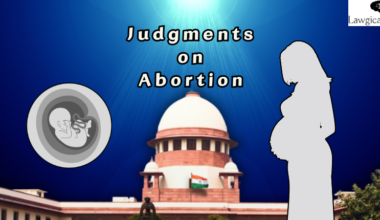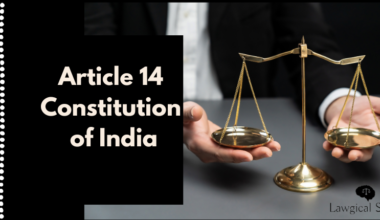The relationship between Principal and Agent in Contract Law has its roots in the legal maxim “Qui facit per alium facit per se”. It means that “he who does the act through another does it himself”. But what are the legal consequences of the acts which were not authorised by the principal? The agent-principal relationship is a bit delicate one and needs better understanding to get the grasp of authorised and ultra vires acts.
Agency under Contract Act
The Indian Contract Act, 1872 deals with deals between parties who agree upon certain terms and conditions. Chapter X of the Act provides for the aspects related to an Agency – the relationship between principal and agent in contract. Sections 182 to 189 lay the law pertaining to appointment and authority of agents. Sections 190 to 195 deal with the context of sub-agents. While section 196 to 200 provide for ratification in case of agency, Sections 201 to 210 of the Act lay about revocation of authority. Sections 211 to 225 provide for the duties of principles and agents against each other. At last, Sections 226 to 238 of Contract Act address the effect of agency on contracts with third persons.
Definition of Agent and Principal in Contract Law
Before understanding the concept of agency and the relationship between principal and agent in contract, it is crucial to know how the statute defines them. Section 182 of the Indian Contract Act defines agent and principal as – “An ‘agent’ is a person employed to do any act for another, or to represent another in dealings with third persons. The person for whom such an act is done, or who is so represented, is called the ‘principal’.” In simple words, one person acting on behalf of another becomes his/her agent. The agent follows the instructions of his/her principal and the duties to be performed are outlined by mutual understanding. The principal in such case is liable for the acts done by the agent. An agent is an agent until he/she acts in accordance with the instructions of the principal. The moment such an agent acts beyond what’s mutually decided, the principal may not be liable for such acts.
It may be noted that among the 10 essentials of a valid contract, consideration is not a must in case of a contract of agency. Section 185 clarifies that no consideration is necessary for creating a relation of principal and agent as per law.
Who can be a Principal?
When we say that one person authorizes another to act on his/her behalf, there are certain requirements for the role. Section 183 of the Act states about who may employ an agent. It provides that “Any person who is of the age of majority according to the law to which he is subject, and who is of sound mind, may employ an agent.” Thus, anyone who is yet to attain the age of majority, or is of unsound mind cannot have an agent to follow instructions or represent the said person for any business.
Who can become an Agent?
When one has to act on behalf of another, there are certain checks to be cleared. Section 184 of Contract Act provides for who may be an agent. It states that “As between the principal and third persons, any person may become an agent, but no person who is not of the age of majority and of sound mind can become an agent, so as to be responsible to his principal according to the provisions in that behalf herein contained.” The provision clarifies that anyone can become an agent. However, a principal cannot be held liable for the acts of a person who is a minor or is of unsound mind. Thus, even if a person is acting on behalf of another, his/her principal cannot be legally held liable for the act so performed if such an agent has not attained the age of majority or is a person of unsound mind.
Understand the complexities in contracts with Advocate Kartikay Sharma
How is the Agency Created?
What we already know is that when one person acts on behalf of another while performing specific contract, it is termed as agency. However, when the relationship between agent and principal is established will be discussed here. There are various modes through which an agency can be created, as recognized under the Act:
- Express Agency
This is the type of agency formed when two parties expressly make an agreement regarding agency. The said agreement may be a written contract or agreed upon orally by the parties.
- Implied Agency
When the conduct of the parties reflects the relationship between principal and agent in contract. There are certain circumstances which imply towards an agency, towards authority entrusted to someone else for certain acts. In this case, express offer and acceptance for creating an agency are not there.
- Agency by Necessity
In case there is no express relationship between agent and principal but the circumstances so happened that the person had to act as an agent in order to safeguard the interests of the principal. Such an agency is established out of necessity.
- Agency by Estoppel/Holding Out
When a person holds out or represents as an agent of another and such other person approves of the conduct, this is how an agency by estoppel or holding out is created.
- Agency by Ratification
When a person acts on behalf of another without any prior authorisation, and the said act/transaction is approved/ratified by the person on whose behalf he/she acted, this is termed as agency by ratification.
Principal Agent Relationship Examples
Understanding the relationship between agent and principal is the easiest and the most difficult, all at the same time. Here, we have compiled some examples to understand agent-principal relationships.
- A hires B to help him with deals and transactions with the vendors in a particular city. Here, whatever business is done by B for A, B is acting as an agent for the terms and conditions specified. In this case, B may be getting a salary or commission on specific transactions, as the case may be. This was an example of express contracts.
- X is a wholesale vegetable vendor who hired the services of Y, a truck owner to transport the vegetables from one state to another. Y could not cross the border due to government orders restricting any movement for the meantime across the borders. Y, knowing that he carried perishable goods in transit in his truck, he offered X to sell off those vegetables in the nearby vegetable market at the wholesale price or a bit lower so that at least they are not ruined and some of the cost price are saved. Here, it may be called an agency in necessity.
- M being a friend of N used to be present at N’s showroom and sometimes handled customers as well when there used to be a shortage of staff. This one customer bought something while paying half the amount from N’s showroom, and paid the rest of amount later to M. N being totally unaware of the payment asked the customer to pay the sum, while he was informed that the amount was already paid to M, whose whereabouts were unknown since the day. Here, N cannot force the customer to pay the rest of amount again because he himself approved of M’s conduct acting as a partner or a helper at his showroom, as an agent. This was an example of agency by holding out.
- When R and S being father and son mutually handle customers at their store, neither father nor son can confront the customers for dealing with the other when it comes to financial transactions. This is an implied agency due to the relationship and handling the business.
Relation of Principal and Agent with Third Party
In general, the rule is that the acts performed and contracts entered by an agent on behalf of the principal towards the third party, have the same effect as if the principal personally did it. The principal is responsible for the acts done by the person acting in the capacity of his/her agent. However, as mentioned earlier, the moment an agent exceeds his/her authority, he/she becomes personally liable. In other words, the principal is only liable for the acts done within the authority of an agent and everything beyond that becomes the liability of the agent. An agent on the other hand cannot be personally bound for contracts made on behalf of his/her principal.
Additionally, in case of misrepresentation or frauds committed by agents in the course of business, principals can be held personally liable unless the same were committed beyond their authority as an agent.








